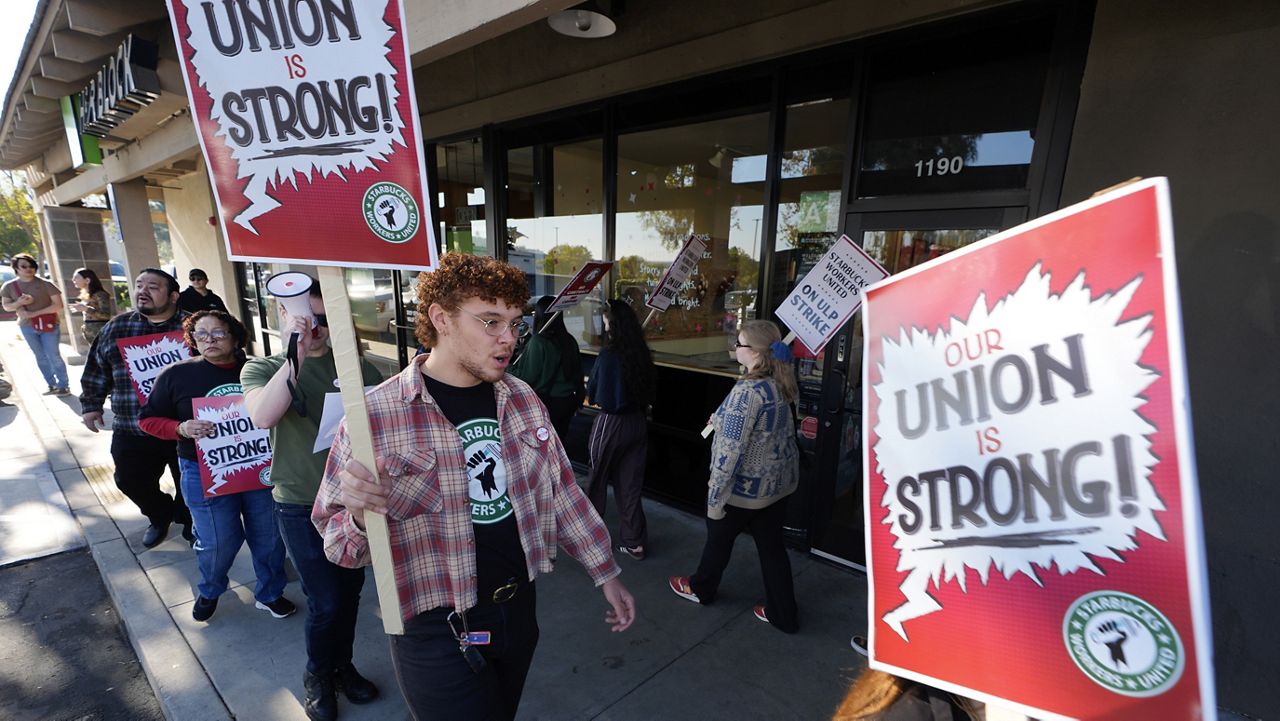Starbucks baristas are on strike in a handful of U.S. cities as they seek to exert pressure to meet demands for an inaugural labor contract.
Union leaders said the strikes expanded on Saturday to include stores in Denver, Pittsburgh and Columbus, Ohio, with plans for baristas to join the picket lines in New Jersey, New York, Philadelphia and St. Louis on Sunday.
Without providing a specific number, labor leaders said dozens of Starbucks stores are now affected by the strike.
The strikes that started Friday followed other recent standoffs between corporate America and organized labor. Large and established labor unions secured meaningful employer concessions this year following strikes by Boeing factory workers, dockworkers at East and Gulf coast ports, video game performers, and hotel and casino workers on the Las Vegas Strip.
But workers at Starbucks, Amazon and some other prominent consumer brands still are fighting for their first contracts. Starbucks long resisted the unionization of its stores, but had agreed to negotiate a contract by the end of the year.
Starbucks Workers United, the union that has organized workers at 535 company-owned U.S. stores since 2021, said the company has failed to honor a commitment made in February to reach a labor agreement this year.
The union also wants Starbucks to resolve outstanding legal issues, including hundreds of unfair labor practice charges that workers have filed with the National Labor Relations Board. The agency also has opened or settled hundreds of charges against Amazon.
In launching the strikes that started Friday in Chicago, Los Angeles and Seattle, Workers United said Starbucks proposed an economic package with no new wage increases for unionized baristas now and a 1.5% increase in future years.
Starbucks said Workers United prematurely ended a bargaining session this week. The company also says it already offers pay and benefits worth $30 per hour for baristas who work at least 20 hours per week.
The strikes won’t be the first for Starbucks during the busy holiday season. In November 2023, thousands of workers at more than 200 stores walked out on Red Cup Day, when the company usually gives away thousands of reusable cups. Hundreds of workers also went on strike in June 2023 to protest after the union said Starbucks banned Pride displays at some stores.
Workers United has said the latest strikes could spread to hundreds of stores across the country by Christmas Eve.
The union and the company struck a different tone early this year, when they returned to the bargaining table and pledged to reach an agreement. Starbucks said it has held nine bargaining sessions with the union since April, and has reached more than 30 agreements with the union.
But Starbucks has struggled with falling sales and lower customer traffic in the U.S. and abroad this year, and the CEO who promised to work for a labor agreement, Laxman Narasimhan, was forced out this summer. Niccol quashed a unionization campaign at Chipotle when he was the CEO there, but he pledged to work constructively with the union in a September letter.
Now, Starbucks and the union appear to be at an impasse.
“In a year when Starbucks invested so many millions in top executive talent, it has failed to present the baristas who make its company run with a viable economic proposal,” Fatemeh Alhadjaboodi, a Starbucks barista from Texas and bargaining delegate, said in a statement.
Patricia Campos-Medina, who recently ran for the U.S. Senate as a Democrat in New Jersey and leads Cornell University's Worker Institute at the School of Industrial and Labor Relations, said she expects there to be more union activity before Trump takes office.
Trump's reactions will give the public a chance to see what his “commitments are to the working class,” Campos-Medina said.



